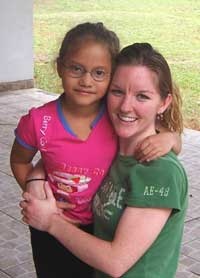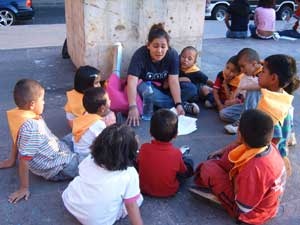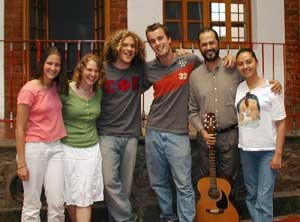|
|
What if eight weeks actually could change your life? When you are 5-years-old, you can already tell people what you want to be when you grow up. In high school, although you may not know what you will study in college, you have already picked your secondary school. By the time you’ve finished a year of college, your life is set in one direction. Right?
Wrong. In a world where we are simultaneously told to “stop and smell the roses” and that “the world doesn’t wait for us,” we have to decide what is most important. We must ask ourselves if we are missing something in all our rushing around. We must honestly ask ourselves that if God were to call us to do something for him, would we hear? Would we act?
Melissa, a short-term missionary with the Latin America Mission (LAM), was finishing her second year of college and looking for an internship. She knew what she wanted in life, and was taking all the right steps to get there. Then God whispered to her what he wanted for her life. Melissa decided to attend InterVarsity Christian Fellowship’s World Missions Conference, “Urbana 2003.” While attending a seminar by Dr. David Befus, president of LAM, God planted a seed in Melissa’s heart. The following summer, Melissa participated in Spearhead, an eight-week program where college-aged participants serve in a local church or Christian ministry, live with a host family, take intensive Spanish classes and share their faith. I recently had a chance to ask Melissa about her experience in short-term missions, and how God led her to Siguatepeque, Honduras.
|
|
Q: What has brought you to Honduras?
A: In October 2003, I was interviewing with a top company for a summer internship position. I blew the interview within the first three minutes. I couldn't believe it; I didn't understand what happened. That December I went to Urbana and attended Dr. Befus’ seminar. His message really hit home. There was something about this opportunity that encompassed everything I was concerned about: what I was studying, what I was passionate about, what little Spanish background I had at the time, but most importantly, my faith.
So I kept the [idea of short-term missions] in the back of my mind. The spring semester rolled around and I was thinking to myself, “I really need an internship; it will help me get a job when I graduate.” So I interviewed again. This time I aced my first interview. They offered me a summer internship. I was thrilled, but at the back of my mind, I thought about the opportunity to go on a short-term mission trip to Honduras. As I prayed about it, I felt God asking me to take a step of faith. There were many issues in going to Honduras. I'd have to leave it in God’s hands. For me it was one of two choices: take a step of faith or take the easy route where everything was already figured out. I weighed the options, talked with others and prayed. I knew that God was calling me to take a step of faith.
![]()
Q: As you adjust to life in Honduras, how do you see yourself in relation to the world? Has your perspective changed from when you lived in the United States?
A: An important question to ask is: How do others here see me and how does that impact me? Through conversations with friends, comments I have heard and observations I have made, I have realized that I am viewed differently because of the color of my hair and my skin tone, both of which for many symbolizes opportunity and wealth. This realization has greatly challenged me and changed my perspective of myself in relation to the world. My perspective has changed from a concept of having to a concept of serving.
|
|
Q: Now that you have lived in Honduras for eight months, do you feel inclined to stay, or are you eager to leave?
A: The pastor of my church was preaching about poverty on Christmas Day. He talked about different types of poverty, but it was the last one that really hit home, it was poverty by choice. Poverty is a real thing here; it’s the norm. Naturally I asked myself, “Poverty by choice? Why would anyone want to be poor by choice?” The pastor went on to talk about everything that Jesus had in heaven . . . streets of gold, a throne, angels who sang of his praises and his holiness day and night. But Jesus’ love is larger than comfort and splendor. He left everything to come to earth, amongst the dirt floor houses, the streets filled with trash, the crops growing on rocky mountain sides, the broken hearts and the broken homes. He chose to leave everything he had to show his love to each one of us. He did this even though we were covered in sin and therefore separated from God.
If Jesus could leave everything he had to demonstrate his love for us, by his strength I want to follow his lead. I want to serve him with everything I have, so that others may have and experience God’s love for them.
Q: What do you love most about your life in Honduras? What do you like least?
A: The thing I love most are my friends who are always quick to give a hug, to lend a listening ear or to pray with me. I have had the privilege of getting to know their families and to learn more about who they are. This is invaluable.
The thing I like the least is losing my independence. In the United States, it’s easy to travel wherever you want, at any time of the day, in your own personal means of transportation. Here, that’s not possible. Other times, losing your independence may take the form of conforming to cultural norms. One example is that the women in my church wear a head covering to the communion service. After several weeks I realized that whether or not I agreed with them on the issue, the more important thing was to follow Christ’s lead and to participate in communion.
Q: What is your greatest social, economic or spiritual concern for Hondurans?
A: My biggest concern for Hondurans is the lack of hope in the culture and in the people. This is evident in the country’s high unemployment rate. There is a widespread inability to pay for necessities. The lack of hope can also be seen in the large numbers of people who move to the United States each year—illegally. It is also manifested socially, especially in the family. Too often parents do not demonstrate love for their children. It comes out in the workplace as well. If someone has a great idea, the rest of the group is quick to dismiss it. They don't want something new or unknown. And they don't want to see others succeed. These attitudes directly influence the people’s view of spirituality. If their jobs, their families and their government have failed them, who is God that he won’t fail them as well? But God has promised us a hope and a joy that only he can give. Those who do believe in Jesus as their personal Lord and Savior know the joy that God has given. It’s real and it’s life changing.
Giving donations, training sessions or technology will not fully advance one’s standard of living or the economic state of the country. What we need to focus on is transformational development, addressing one’s economic, social and spiritual needs by realizing that our true identity is in God.




